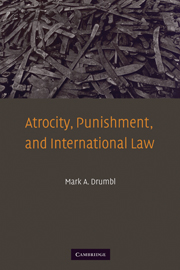Part of the International Conflicts series
Mark Drumbl: Bosnia v. Serbia Litigation: What it Means for Transitional Justice

Mark Drumbl, of the Washington and Lee University School of Law, discussed transitional justice in the former Yugoslavia.
Although Nuremberg effectively prosecuted individuals for their crimes, the notion of collective liability was first established with the Yugoslavian case and could potentially be used as an effective tool of justice.
The Feb. 26, 2007 ruling of Bosnia and Herzegovina v. Serbia and Montenegro
But it also concluded that Serbia as a state:
- was not directly responsible for the genocide as a whole
- was responsible for not preventing events such as Srebenica
- had breached the genocide convention by failing to fully cooperate
Serbian leaders “should have made the best effort within their power to try and prevent the tragic events then taking shape.”
This was the first time a state had been held in breach of the Genocide Convention. However, the remedy was only through this declaration, and there was no imposition of financial damages.
BH agent, Sakib Softic, is recorded as saying both parties,
should accept the judgment in its entirety, and not only in parts favorable to them.
Although the approach was innovative, it left all parties slightly satisfied, and nobody fully satisfied. There is talk of accomplishing a lawyers’ justice, and not a people’s justice, especially with the lack of financial compensation.

Drumbl has a new book available that discusses these issues in more depth.
Â
These notes are from the Cross-Purposes? International Law and Political Settlements conference at the University of Western Ontario, on Jun. 9-10, 2007, with some editorial content added by Omar Ha-Redeye.
